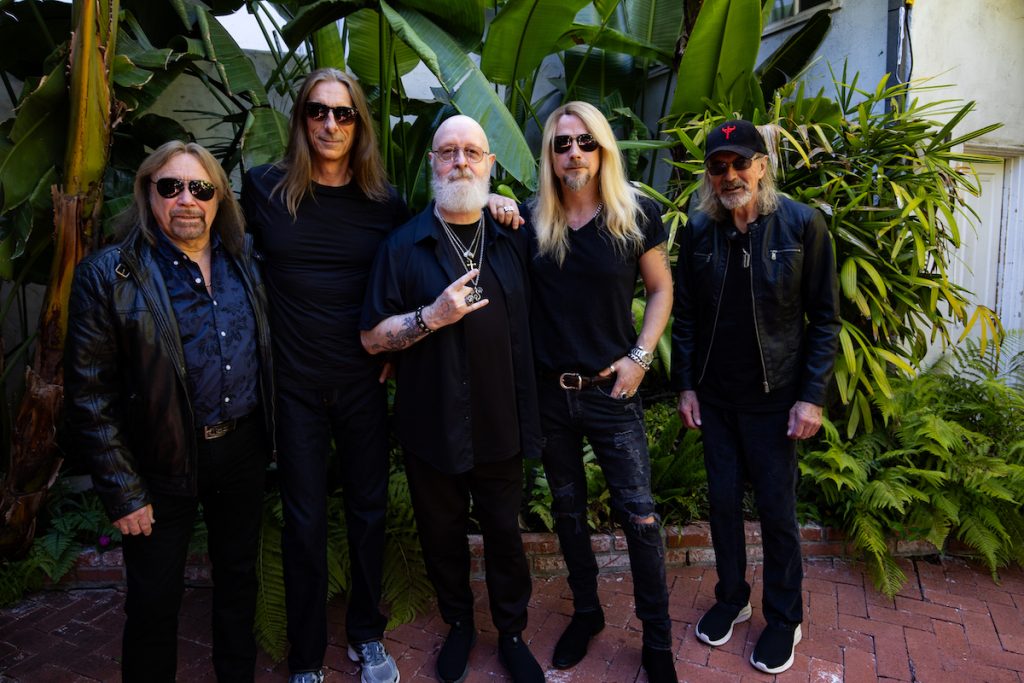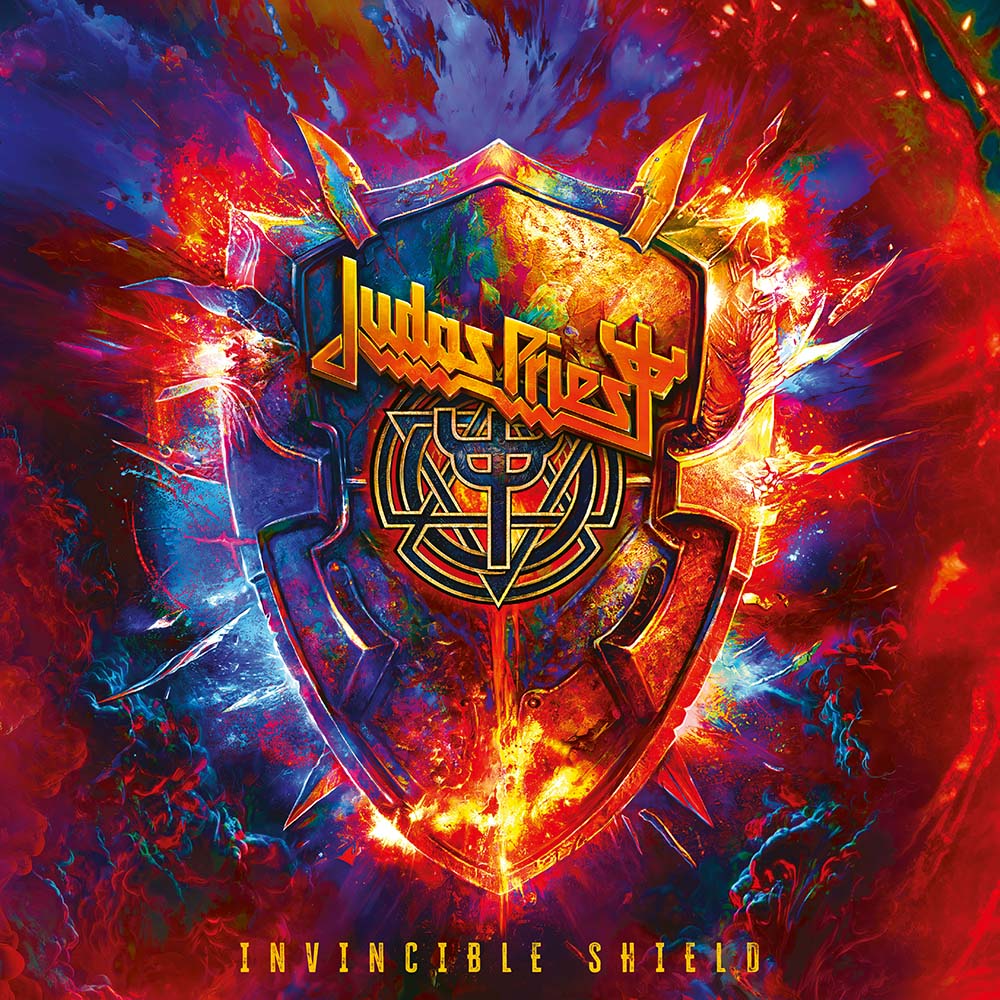Culture
Judas Priest founding member Ian Hill talks about taking ‘two steps forward’ on ‘Invincible Shield,’ the band’s underrated gems, and the moment Priest’s staying power became clear
By: Nicholas Kobe
Posted on:
COLUMBUS, Ohio (WOUB) – In the pantheon of heavy metal, few bands command the kind of respect Judas Priest does.
It all started in 1969, in the English industrial city of Birmingham. At first, Judas Priest was a heavy rock and blues band – akin to Led Zeppelin or Black Sabbath. By the mid-’70s, however – and with songs like The Ripper and Dissident Aggressor – the band was becoming something entirely distinct and progressively more aggressive.
Once Killing Machine (or Hell Bent for Leather, as it’s known in the U.S.) was released in 1978, Priest had fully shifted to a fast, brutal, yet still catchy sound. By then, lead singer Rob Halford was donning leather and the band was cultivating its signature visual aesthetic.
Priest dominated in the early ’80s, releasing albums which would go on to define the very genre conventions of “heavy metal,” like British Steel, Screaming for Vengeance, and Defenders of the Faith.
Through the late ’80s Priest experimented with pop-metal sounds before taking a plunge to the more aggressive with 1990’s Painkiller. Through the ’90s, the band went through some notable lineup changes, including Halford’s departure – he would eventually return for 2005’s Angel of Retribution. 2008’s experimental concept record, Nostradamus, was the final to feature longtime guitarist KK Downing. Richie Faulkner took his place, quickly acclimating and contributing to the band’s successful Redeemer of Souls and Firepower albums.
Priest started the present decade basking in success, celebrating the band’s 50th anniversary and an induction into the Rock and Roll Hall of Fame in 2022. Despite the laurels the band received, fans knew these metal gods were far from calling it quits.
This prediction came to fruition last October with an announcement of an upcoming full-length – Invincible Shield, set for release March 8.
WOUB’s Nicholas Kobe spoke with founding member and bassist Ian Hill. Find a transcript of their conversation, edited for length and clarity, below.
This interview is a part of WOUB’s Sonic Temple Art & Music Festival 2024 preview coverage. The festival happens May 16-19 at Historic Crew Stadium (1 Black and Gold Blvd.) Judas Priest plays the festival May 16.
Find all of WOUB’s Sonic Temple 2024 coverage – including interviews with artists like Bobo of Cypress Hill and Nita Strauss – at this link.

Ian Hill: Oh, I’d say loud, exciting, complicated – you can’t dance to it.
I’m talking to you about a month before the release of Invincible Shield. What’s something you are proud of – excited about- so far as the writing process of that record?
Ian Hill: Well, I’m not one of the writers. That’ll be Richie [Faulkner], Glenn [Tipton], and Rob [Halford] doing the writing – but it’s a step forward from Firepower, which is what we always set out to do with each album. We always try and improve. You never stop learning. We’ve always tried to take a step in the right direction with each record. This one is probably two steps in the right direction, basically because of the lockdown and COVID. There’s a hell of a lot of time there for Richie, in particular, to really polish the songs and add things in, take things out, and change things around before we had a chance to get into a studio.

The bass was the last thing to be put down in this instance. We got lots of days off between shows, so we figured we might as well be productive. Andy [Sneap] was with us, the producer, he got his laptop, hooked the bass straight in, and away we went. Great way of recording, really laid back and trouble-free.
I’m assuming you had never recorded like that before?
Hill: No. I never thought I would, either.
Is it something that you liked better or worse?
Hill: It was different. You don’t get the pressure. I mean, even with a band of our stature – we’ve been around for a long time – but you still get some pressure in the studio. You’re playing something new, for a start. And it doesn’t matter what you say, or how good you think the part is you’ve done, there’s generally always room for improvement: ‘I wish I’d have played that instead,’ little bits and pieces, ‘I should have followed the drum line there,’ whatever.
In a studio where you’ve got a certain amount of time to do stuff, you don’t notice these things until some time afterward. But the way we put the bass down, we would have one day off and pick one song and we just played it and listened to it. So we could be like ‘change a little bit there, do a little bit there. You weren’t very tight there,’ and just polish everything up and get it to about as perfect to the other instruments as possible. We just did one track a day.
The pressure was off, in the studio you’ve got five or six sets of eyes on the back of your head like ‘hurry up, it’s my turn now.’ Doing it this way, none of that stuff. It worked really well and it made Andy’s life a little simpler. He could come straight off tour and get straight into his studio and start putting it together and mixing it.
You said the band tries to always “take a step in the right direction” with each album – and that you feel Invincible Shield is “two steps ahead.” Is there anything in particular you can point to that makes Invincible Shield that much further ahead?
Hill: Yeah, it is a lot busier. It harks back to some of the earlier stuff we did back in the late ’70s, and early ’80s. There are different parts of a song, highs and lows and whatever. So it is different in that respect. Like I said, it’s a lot more polished. It’s a lot more complete, I think, as well – and flows a lot better. A lot more light and shade with this one. It’s something we’re all very, very proud of and we can’t wait to get out there and play, well, at least some of the songs on tour. You can’t play all of them, unfortunately, but at least some of them. We’re looking forward to that.
Could you talk about how the band has evolved, in terms of your sound, over the years?
Hill: “Evolved” is the right word. I mean, when we started way back with first album in 1974, “heavy metal” wasn’t a thing – what we were making was called “heavy rock,” or even “progressive rock.” Heavy metal wasn’t around really until the late ’70s, but our evolution was a part of [the genre solidifying]. Although we’ve had personnel changes, they’ve been very few and far between if you look at the whole scope of the band’s history. I mean, Richie is still looked upon as the “new kid” and he’s been with the band now 12 years.
“I mean, when we started way back with first album in 1974, “heavy metal” wasn’t a thing – what we were making was called “heavy rock,” or even “progressive rock.” Heavy metal wasn’t around really until the late ’70s […]” – Ian Hill, Judas Priest founding member and bassist
You just came off of the 50 Years of Heavy Metal Tour and the band’s Rock and Roll Hall of Fame induction. Was there any particular moment, in the story of Judas Priest, when you realized exactly how big this was going to be – the kind of impact this band was going to have?
Hill: Back in 1982, we were recording Screaming for Vengeance. We were one song short. It was in the days of vinyl. When you’ve got a vinyl record, there’s only so much music you could get on there before the sound starts to deteriorate. And we threw together You’ve Got Another Thing Coming. It was something that we just threw together, and for one reason or another AM radio, which would be like the equivalent of mainstream media these days, picked up on it and they played the heck out of it, and suddenly we were having to cancel the venues we were booked in because we needed larger venues.
That’s when you think, ‘Geez, we are making it.’ We’d had a steady build right from ‘74, and we’ve been building up steadily, which was the plan basically. But really, with that one song, if people hear that on the radio, they go out and buy the album, they come and buy a concert ticket, what have you, because it piques their interest. That’s when it took off. And throughout the ’80s there it went even further right up to Turbo.
Looking back through the Judas Priest catalog, are there any albums, or songs, you feel have gone under the radar?
Hill: There are a few of those. Fever was a great song, an underrated song. [Same with] Worth Fighting For. Like I say, you get a new album out, and we’ve got a new one now, so we’re trying to winkle out which ones we are going to play live. It’s not just because some are better than others, we don’t look at it like that.
It’s what’s going to fit into the setlist. Once you start playing a certain few songs off the records, that’s what people want to listen to. They like that song and they’ve seen you play it live, and they come next time to see you do it again.
Although, Dissident Aggressor is my all-time favorite Priest song from all those years ago – because it’s just so raw. You’ve just got two guitars, bass, drums, vocals, and an extra guitar, when the lead break comes in, that’s all you’ve got on that song. There’s no production piece on there, there’s nothing. It’s just so wild and raw. We don’t get to play that often.
It’s a great one. I’m interviewing you ahead of Sonic Temple 2024, which you guys are playing at. What’s something that you look forward to in particular about playing big festivals as opposed to headline shows?
Hill: It’s the diversity of the bands. You see some festivals go on for a whole weekend. There are up to five days worth of bands, and people buy tickets for every day, so you get to play to people that wouldn’t necessarily come to your show. In particular, for the up-and-coming bands, it’s great exposure because there’s so many people at a festival. They’re there and they’re watching you. It gets them into the public eye and they’re great from that point of view. The drawback is, of course, you’re on a great big stage and you’re about 30 feet away from the audience. So the crowd tends to be a little bit more remote than we’d like, but that’s the nature of festivals.
What’s next for Judas Priest?
Hill: Well, the tour we’ve got the rest of this year, it’s already planned: two legs in Europe, two legs in the States, and I think Japan, at the moment. It’ll probably run on into 2025 as well. We do the other parts of the world. So we’ve got a lot on our plates at the moment. After that we’ll see where we are and see where we go from there.

